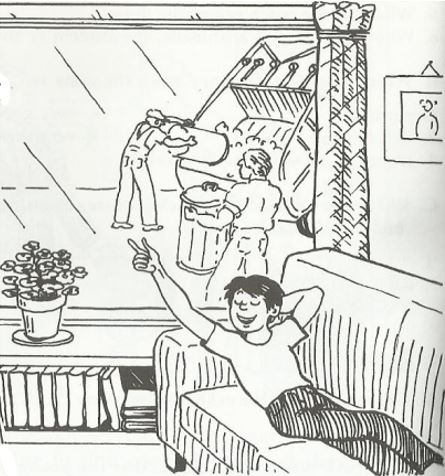

Grammar


Tenses


Present

Present Simple

Present Continuous

Present Perfect

Present Perfect Continuous


Past

Past Simple

Past Continuous

Past Perfect

Past Perfect Continuous


Future

Future Simple

Future Continuous

Future Perfect

Future Perfect Continuous


Parts Of Speech


Nouns

Countable and uncountable nouns

Verbal nouns

Singular and Plural nouns

Proper nouns

Nouns gender

Nouns definition

Concrete nouns

Abstract nouns

Common nouns

Collective nouns

Definition Of Nouns

Animate and Inanimate nouns

Nouns


Verbs

Stative and dynamic verbs

Finite and nonfinite verbs

To be verbs

Transitive and intransitive verbs

Auxiliary verbs

Modal verbs

Regular and irregular verbs

Action verbs

Verbs


Adverbs

Relative adverbs

Interrogative adverbs

Adverbs of time

Adverbs of place

Adverbs of reason

Adverbs of quantity

Adverbs of manner

Adverbs of frequency

Adverbs of affirmation

Adverbs


Adjectives

Quantitative adjective

Proper adjective

Possessive adjective

Numeral adjective

Interrogative adjective

Distributive adjective

Descriptive adjective

Demonstrative adjective


Pronouns

Subject pronoun

Relative pronoun

Reflexive pronoun

Reciprocal pronoun

Possessive pronoun

Personal pronoun

Interrogative pronoun

Indefinite pronoun

Emphatic pronoun

Distributive pronoun

Demonstrative pronoun

Pronouns


Pre Position


Preposition by function

Time preposition

Reason preposition

Possession preposition

Place preposition

Phrases preposition

Origin preposition

Measure preposition

Direction preposition

Contrast preposition

Agent preposition


Preposition by construction

Simple preposition

Phrase preposition

Double preposition

Compound preposition

prepositions


Conjunctions

Subordinating conjunction

Correlative conjunction

Coordinating conjunction

Conjunctive adverbs

conjunctions


Interjections

Express calling interjection

Phrases

Sentences


Grammar Rules

Passive and Active

Preference

Requests and offers

wishes

Be used to

Some and any

Could have done

Describing people

Giving advices

Possession

Comparative and superlative

Giving Reason

Making Suggestions

Apologizing

Forming questions

Since and for

Directions

Obligation

Adverbials

invitation

Articles

Imaginary condition

Zero conditional

First conditional

Second conditional

Third conditional

Reported speech

Demonstratives

Determiners


Linguistics

Phonetics

Phonology

Linguistics fields

Syntax

Morphology

Semantics

pragmatics

History

Writing

Grammar

Phonetics and Phonology

Semiotics


Reading Comprehension

Elementary

Intermediate

Advanced


Teaching Methods

Teaching Strategies

Assessment
One day a week
المؤلف:
L.A Hill
المصدر:
Advanced-Anecdotes in American English
الجزء والصفحة:
4-1
11/10/2022
1219

John was ten years old, and he was a very lazy boy. He had to go to school of course, but he was bored there and tried to do as little work as possible. His father and mother were both doctors and they hoped that he would become one, too, when he grew up, but one day John said to his mother, "When I finish school, I want to become a garbage collector."
"A garbage collector?" his mother asked. She was very surprised. “That's not a very pleasant job. Why do you want to become a garbage collector?"
"Because then I'd only have to work one day a week," John answered.
"Only one day a week?" his mother said. "What do you mean?"
"Well,” John answered, "I know that the ones who come to our house only work on Wednesday, because I only see them on that day."
A Answer these questions:
- What kind of boy was John?
- What did his parents want him to be when he grew up?
- What did John say he wanted to be?
- Why did John want this job?
- How did his mother feel about this?
- Why did John think that garbage collectors only worked one day a week?
B Which words in the story mean the opposite of:
- despaired
- impossible
- interested
- replied
- start
- unpleasant
C Put two words in each blank space in the second sentence of each pair (both sentences have the same meaning):
Example: a. When John arrived home, he told his mother his decision.
b. Arriving at home, John told his mother his decision.
1. a. After John had watched the garbage collectors on his street, he decided he wanted to become one, too.
b. ___________the garbage collectors on his street, John decided he wanted to become one, too.
2. a. Before John decided to become a garbage collector, he did not know what he wanted to be.
b. __________to become a garbage collector, John did not know what he wanted to be.
3. a. While John studied at school, he was bored all the time.
b. ___________ at school, John was bored all the time.
4. a. John surprised his mother because he said that he wanted to become a garbage collector
b. John surprised his mother _________ that he wanted to become a garbage collector.
 الاكثر قراءة في Advanced
الاكثر قراءة في Advanced
 اخر الاخبار
اخر الاخبار
اخبار العتبة العباسية المقدسة

الآخبار الصحية















 قسم الشؤون الفكرية يصدر كتاباً يوثق تاريخ السدانة في العتبة العباسية المقدسة
قسم الشؤون الفكرية يصدر كتاباً يوثق تاريخ السدانة في العتبة العباسية المقدسة "المهمة".. إصدار قصصي يوثّق القصص الفائزة في مسابقة فتوى الدفاع المقدسة للقصة القصيرة
"المهمة".. إصدار قصصي يوثّق القصص الفائزة في مسابقة فتوى الدفاع المقدسة للقصة القصيرة (نوافذ).. إصدار أدبي يوثق القصص الفائزة في مسابقة الإمام العسكري (عليه السلام)
(نوافذ).. إصدار أدبي يوثق القصص الفائزة في مسابقة الإمام العسكري (عليه السلام)


















